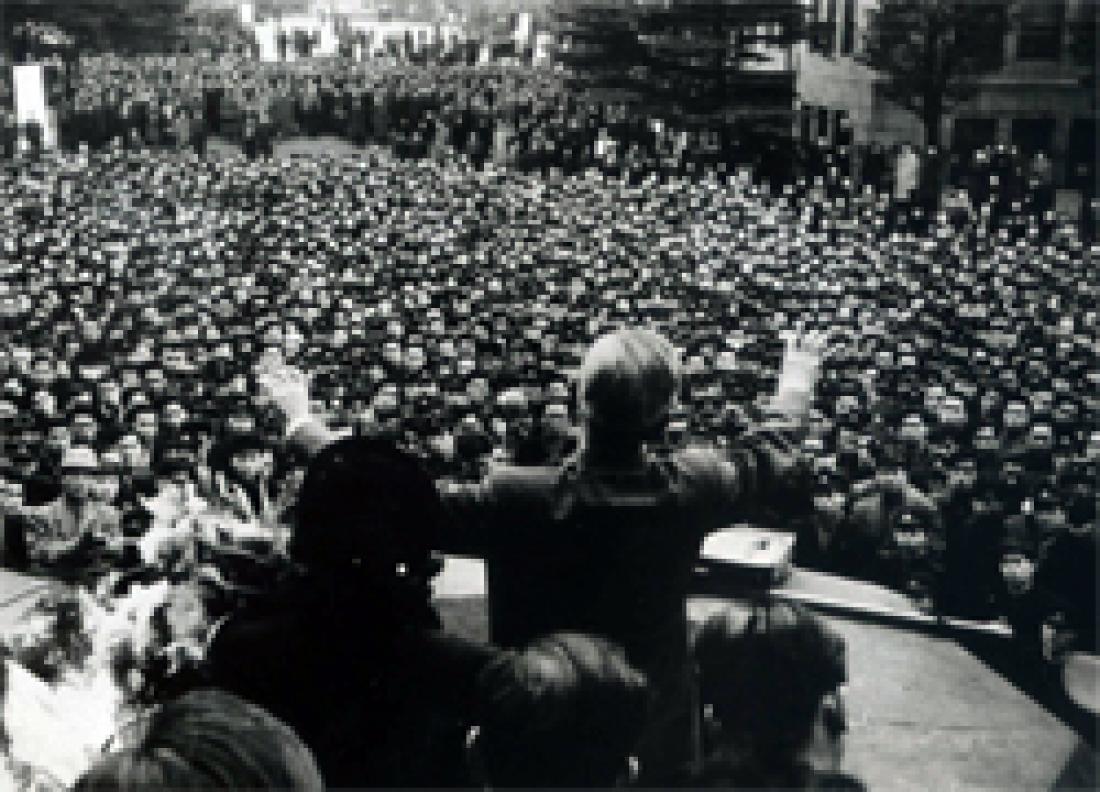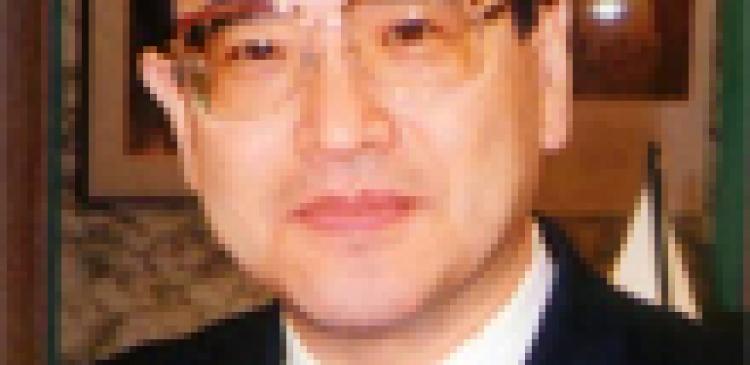Ikuo Oyama, greeting crowds in front of the Okuma Auditorium
Shozo Tanaka, a famous politician of the Meiji period, devoted himself to the interests of farmers suffering from metal poisoning, and over the course of his life, showed himself to be a truly selfless person. When it comes to some of the biggest names in the Taisho period, Takashi Hara, who became prime minister, worked out a scheme for greater power for his political party, Seiyukai, and was eventually struck down by an assassin. His reward was not a personal fortune, but rather public praise and censure. The way of life for politicians is to sacrifice their lives for the sake of people like the farmers, to strengthen their party, or to achieve other such purposes–not simply doing a job to make a living.
Citizens struggled as much as politicians did. They were hard pressed and suffered from unreasonably high taxes and rice prices, which led to successive incidents of bloodshed. Depression and the impoverishment of farm villages directly hit the people, even in the Showa period. Thus, it was natural for public dissatisfaction to be directed towards politicians and the capitalists who were considered their sponsors. Everything, including colonial administration, anti-Japanese nationalism in China, and the race against the West, involved the people. Where could they see any light?
Sentiment toward the February 26th Incident
Where is Japan headed? What will become of our lives? If we cannot expect politicians to address our anxieties, we must rise to take action. This was the thinking of a number of young military officers at that time. The February 26th Incident of 1936 was the result. This incident was triggered by the eruption of their sentiment regarding the plight of farmers, not because of spreading internal factional disputes. Although they considered themselves to be an advance guard for the people, they were never organizers of the people. The incident resulted in accelerating the advancement of military officers into politics. I will not touch here upon the whole story of the February 26th Incident that arose through the presence of an ex-military officer, Mitsugi Nishida, and the orientation of revolutionary social changes from the nationalist perspective since they are discussed in detail in my 800-plus-page book, Mitsugi Nishida and Japanese Fascism Movements [Nishida Mitsugi to Nihon Fashizumu Undo] (2007, 1st edition, 2008, 3rd edition, Iwanami Shoten). The poverty of politics is, however, an important theme to be seriously considered as we move forward.
Politicians for the people
When we think about examples where politicians stand on the side of the public, the case of Ikuo Oyama is exemplary: where the tripartite struggle for the acquisition of political freedom, the elimination of exploitation, and colonial liberation was carried by the proletarians led by Ikuo Oyama, including farmers, laborers, small businesspeople, and ordinary citizens.
Ikuo Oyama was a forever young master politician. He was originally an advocate of Taisho Democracy and became a leader of proletarian party activities. After World War II, he played the role of driving forward world peace movements. When news attracted public attention that Hideki Yukawa was the first Japanese person to win a Nobel Prize, a peerless critic, Soichi Oya said: “Since the Taisho period, there have been few besides Ikuo Oyama who became the subject of talk among people nationwide irrespective of position, class, and age…aside from his time in exile in the United States, he was a great actor who was always under the spotlight of social movements as well as the darling of journalism. He showed such qualities by his nature rather than by intentional grandstanding…there is none but him in the country who perfectly suits his famous line, ‘We are headed for either a battlefield or a graveyard.’ If anyone else had said that, it would have sounded affected, even disgusting.”
Where can we find a second Ikuo Oyama today?
Ikuo Oyama was originally a political scientist who devoted himself to the transformation of a politics that serves the nation to one that serves the people. He stressed that political science should have humanity, and that is why he looked for a way to unify ideologies and practices and even moved toward Marxism. Further details are included in my book Ikuo Oyama and the Genealogy of Japanese Democracy—From the Science of the State to the Political Science of Society [Oyama Ikuo to Nihon Demokurashî no Keifu-Kokkagaku kara Shakai no Seijigaku e] (2011, Iwanami Shoten). During a crucial time of proletarian party activity, he was made the chairman of the Labor-Farmer Party with the people’s support and was removed from his teaching position at his alma mater, Waseda University. With a pure heart, he took pleasure in working devotedly for the people, regarding the working masses, together with his students, as his important comrades. Oyama risked everything and made every effort for the sake of farmers and plant workers amid moves to suppress him as a far-left Diet member of the Proletarian Party, with just five members. One of his fellow members, Senji Yamamoto, died at the hands of an assassin. Neither Oyama nor Yamamoto ever used such superficial language as for the nation and the people or thinking from the standpoint of the people. Those who they saw right in front of them were living beings—farmers who were starving, factory workers whose wages had been cut, and small businesspeople worried every day about sales. Where are the Oyamas and Yamamotos of today?
The people have no option to leave
Having been developed by mankind and protected with every effort for our happiness, an ideology is a source of vitality to move forward. Political arguments are the discussions that turn such ideology into the modalities of politics, influence people, and encourage them to take action; politicians must have the talent to make such political arguments.
When I think of a political orator, Kanji Maruyama comes to mind. Maruyama was a newspaper reporter (the political scientist Masao Maruyama being his second son) who has dedicated himself to writing for more than half a century with a spirit of criticism that does not simply go along with the current of the times. Here is what he said: Whatever the decisions that soldiers and politicians make in their course of action, the people of the nation are never allowed to resign their positions. People living in this society have no option to leave. That’s how it is. We, and not politicians alone, will get nowhere without being responsible and independent ourselves.
ABOUT THE AUTHOR
Makiyo Hori
Professor, Graduate School of Political Science, Waseda University
Born in 1946. Graduated from the School of Political Science and Economics, Waseda University. He took up posts including Dean of the Department of Law, Seinan Gakuin University, Visiting Professor at the University of Cambridge, and Research Fellow at the University of Oxford, before taking up his current position. His publications include: Mitsugi Nishida and Japanese Fascism Movements [Nishida Mitsugi to Nihon Fashizumu Undo] (2007, 1st edition, 2008, 3rd edition, Iwanami Shoten), The Record of a Refugee—The Story of Chi Myong Kwan [Ichi Boumeisha no Kiroku—Chi Myong Kwan no koto] (2010, Waseda University Press), and Ikuo Oyama and the Genealogy of Japanese Democracy—From the Science of the State to the Political Science of Society [Oyama Ikuo to Nihon Demokurashî no Keifu-Kokkagaku kara Shakai no Seijigaku e] (2011, Iwanami Shoten). His translations include Fashizumu wo Koete—Ichi Seiji Gakusha no Tatakai [Where do we go from here?] (New edition, 2009, Waseda University Press). He received the Azusa Ono Memorial Award in 1974, the Special Award for Distinguished Service of Sakurada-kai for Political Research and the Okuma Memorial Academic Prize in 2009.
============
Copyright Notice
All of the articles, images, photographs and other content displayed above are owned by Waseda University. Permission to reproduce any content is subject to the following Terms of Use.
Terms of Use
- Content may not be used in a manner that may harm the honor or reputation of Waseda University.
- When reproducing any content, you must request permission by notifying the Office of Information and Public Relations of Waseda University through e-mail ([email protected]) and indicate the title of the media and intended date of reproduction. Unauthorized reproduction is strictly prohibited.
- Please cite clearly the source of content at the end of each article using the following format (Source: Research SEA yyyy/mm/dd).
- Content may not be altered or modified in any way. Manipulation of photographs is strictly forbidden. Use of quotations as protected under copyright law is limited to summarization or quotation of the main point.
- Use of content is protected under the copyright law. Any claims or disputes, privacy issues, or other matters related to copyrighted content not owned or controlled by Waseda University becomes the sole responsibility of the user.
============




